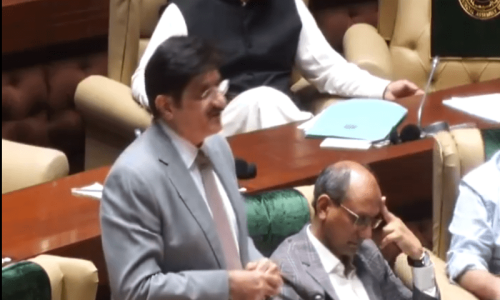KARACHI: At least 994 new HIV/Aids cases, including 83 women and six children, have been detected across the province this year, said an official of the Sindh Aids Control Programme (SACP) here on Thursday.
“These numbers could be alarming for everyone, but as a matter of fact this reflects the efficiency of our monitoring and reporting system,” said SACP project director Dr Sikander Ali Shah while speaking to journalists after an awareness workshop held to mark the World Aids Day, which is observed every year on Dec 1.
Dr Aftab Ahmed, SACP monitoring officer, said that 905 out of 994 people tested HIV/Aids positive in Sindh were men. Eighty-three of them were women and six others were children — four boys and two girls — aged less than seven years, he added.
The children were either cases of mother-to-child HIV transmission or were thalassemic who were afflicted with the deadly disease through contaminated blood transfusion.
The official said that 29 people — five men and 24 women — diagnosed with HIV/Aids died this year, while 265 people had died of HIV/Aids since 2003.
Experts said some 35 million people across the world lived with HIV of whom 3.2 million were aged less than 15 years. They said Pakistan’s estimated HIV population was 106,000 while the reported cases were around 7,500, of whom 6,975 were HIV and 525 were infected with Aids.
In Sindh, some 3,524 HIV/Aids cases have been registered since 2003. Of these people, 2,990 are men, 401 are women, 101 are children and 32 transgenders.
The participants were informed that the SACP had screened 2,649 prisoners in various prisons of the province in 2003 and found only one of them HIV positive. A similar campaign was recently carried out, but results of the tests are still awaited.
The experts called Pakistan as a country with concentrated epidemic, a global standard to the nations where HIV prevalence is less than one per cent in general public but more than five per cent among the high-risk group. The participants were informed that injecting drug users formed the highest group at risk in Pakistan with 37.6 per cent out of total patients while the same ratio in Karachi was 42pc.
Dr Shah said the SACP had already moved a summary to the Sindh government for a one-billion-rupee project featuring ambitious plans to carry forward the programme to grassroots level — from present tertiary care hospitals to basic health units in remote parts of Sindh.
Five new Aids centres planned
He said five new Aids diagnostic centres would be established in different cities of the province soon.
Dr Shah said new diagnostic and treatment centres would be established at Jinnah Postgraduate Medical Centre and Abbasi Shaheed Hospital in Karachi; Liaquat Medical University Hospital Hyderabad, and Civil Hospitals of Benazirabad and Sukkur districts.
Two similar facilities are currently available at the Civil Hospital Karachi and one each at Indus Hospital, Aga Khan Hospital and Larkana district.
Dr Rajinder Kumar said key high-risk HIV groups included long-distance truckers, female sex workers, transgender sex workers, men having sex with men, IDUs, jail inmates, children born to infected parents, street children and victims of unsafe blood transfusions.
However, officials said, the 11 non-governmental organisations which worked hand-in-hand with the SACP in fight against HIV had not been paid their funds for the past three quarters. They said the provincial government was informed about the paucity of funds the SACP had been facing and requested for financial help.
Published in Dawn, November 28th, 2014
















































